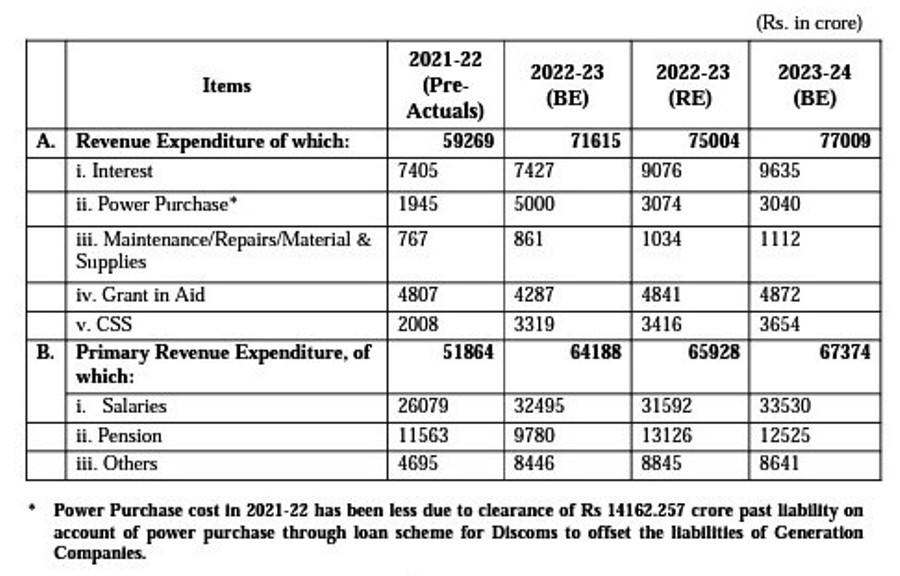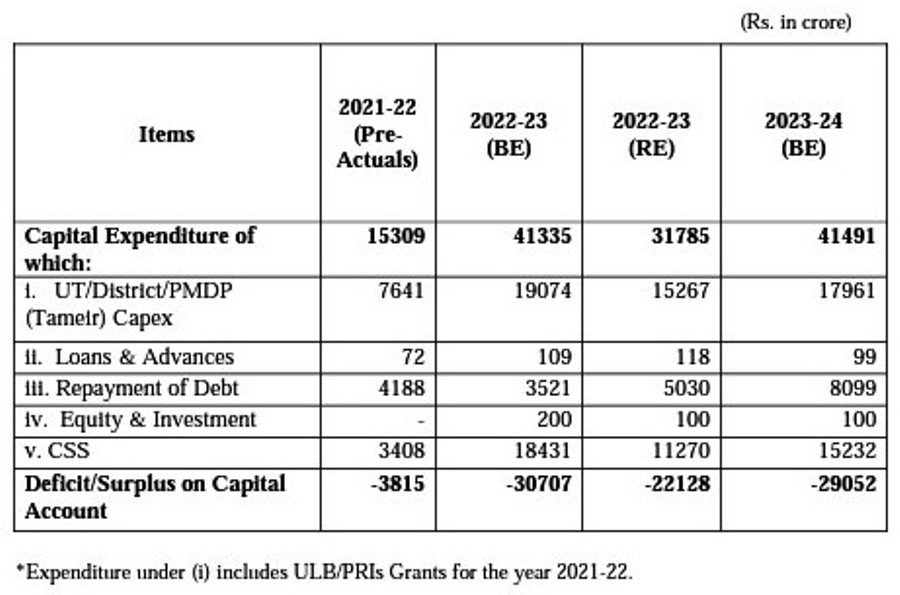Nirmala Sitharaman’s fourth consecutive budget has reduced funds for developmental activities as expenditure booked for asset creation in 2022-23 saw a steep fall, reports Raashid Andrabi

Last week, Finance Minister Nirmala Sitharaman presented Jammu and Kashmir’s fourth consecutive budget, for fiscal 2023-24. At Rs 118,500 crore, it is said to be the highest-ever budget estimate to have been presented for the next 365 days for Jammu and Kashmir, ending March 31, 2024.
Money Goes
The government is anticipated to spend Rs 33530 crore on salaries, Rs 12525 on pensions to the superannuating staff and Rs 8641 will go to “other” heads that are part of the primary revenue expenditure. That means 38.86 per cent of the total budget will go to the staff that man the government. Against booking an expenditure of Rs 44718 crore in 2022-23, the government would spend Rs 46055 crore on the salary and pension of its staff in 2023-24.
The government will purchase power worth Rs 3040 crore in fiscal 2023-24. Off late, the government has reduced funds for power purchases. In 2022-23, the resource allocated for power purchases for water-abundant and energy deficit was at Rs 5000 crore. However, the revised estimates suggest only Rs 3074 crore was spent.
The government is anticipated to pay Rs 9635 crore as interest payment – almost eight per cent of the overall expenditure. For the current fiscal the interest payments are at Rs 9076 crore. Besides, the government will clear debts – part of the capital expenditure, worth Rs 8099 crore. For 2022-23, the target was to repay Rs 3521 crore but the administration eventually paid back Rs 5030 crore.

Developmental Activities
The developmental activities are allocated Rs 33,193 crore, including Rs 17,961 crore under PMDP and Rs 15,232 crore under CSS. Jammu and Kashmir will offer a mandatory contribution of Rs 3654 crore as its share to access CSS funds. This means 28.01 per cent of the overall spending stands allocated to developmental activities. It is Rs 4312 crore lesser than the allocations that had been made for developmental activities for 2022-23.
In fiscal 2022-23, Nirmala Sitharaman’s budget had allocated Rs 37505 crore (33.2 per cent of the overall expenditure) for developmental activities of which Rs 19074 crore was under PMDP and other allied projects and Rs 18431 crore of centrally sponsored schemes. However, the revised estimates laid on the table in Lok Sabha suggest an expenditure of only Rs 26537 crore (24.84 per cent) was booked, which is Rs 10968 crore less.
No details have been offered in the budget for the reduced allocations for developmental activities and the administration’s failure in spending the entire developmental allocation made for fiscal 2022-23.
The Income
On the income side, the centre will provide grants worth Rs 64,319 crore. Since Jammu and Kashmir is no longer a state and is reduced to a Union territory, the share from the central tax pool is now being converted into an outright grant.
Jammu and Kashmir has its own resources as well. It will be raising a tax revenue of Rs 20349 crore and non-tax (mostly services) of Rs 13,593 crore. That means that Jammu and Kashmir will raise almost Rs 33942 crore within the UT, which is 28.64 per cent of the overall fund requirement for fiscal 2023-34.

The budget indicates that Jammu and Kashmir will have additional resource mobilization of Rs 7,800 crore, which includes asset monetization. Besides, Jammu and Kashmir will borrow Rs 12439 crore from the market and within the system to fund the budget.
In fiscal 2022-23, the budget estimates had anticipated receiving Rs 34116 crore from its own resource – tax plus non-tax. However, it ended up collecting only Rs 28012 crore. Though all tax collections were achieved, the shortfall was in power tariff collections (got Rs 4609 instead of Rs 5000 crore) and additional resource mobilisation. Against a target of Rs 8802 crore for ARM, Jammu and Kashmir could mobilise a resource of only Rs 2484 crore.
The Speech
Sitharaman’s speech indicated that several objectives are laid out, including good governance, democracy at the grassroots level, sustainable agriculture, investment and industrial growth, employment generation, development acceleration, inclusivity, women empowerment, and social inclusion. It suggested that the government intends to double Jammu and Kashmir’s GDP within the next five years. It put the current GDP at Rs 2,30,727 crore
Sitharaman promised that all 18.36 lakh households in Jammu and Kashmir will have functional tap connections by 2023-24. Every household will be provided drinking water with a minimum of 55 litres per capita per day and of prescribed quality on a regular, long-term, and sustainable basis.
Agriculture and horticulture have been allocated Rs 2,526.74 crore, health and medical education have been allocated Rs 2,097.53 crore, rural development got Rs 4,169.26 crore, the power sector was given Rs 1,964.90 crore, Jal Shakti has been allocated Rs 7,161 crore, housing and urban development got Rs 2,928.04 crore, education has been allocated Rs 1,521.87 crore, and construction of roads and bridges has been allocated Rs 4,062.87 crore.

Responses
The budget estimates generated a mixed response from the political and business classes. The ruling BJP commended the budget for its efforts to promote economic growth and development, but others disagreed.
The National Conference (NC) has been vocal in its criticism of the budget, referring to it as mere “flamboyance and wordplay” with no real substance for trade, industry, and commerce. They have expressed disappointment at the lack of a clear blueprint for job creation and the lack of focus on the horticulture sector, which is a significant contributor to the region’s economy. They also raised concerns about the plight of unemployed youth and the need-based employees who were not given much consideration in the budget. They further questioned why the elected Assembly was not consulted before the budget’s tabling for the fifth time in a row.
Comrade Yousuf Tarigami, a long-term lawmaker expressed his disappointment stating the budget failed to address critical issues such as unemployment and inflation, which continue to plague the region. He believes that the budget should have had more concrete plans to create employment opportunities and reduce the rising inflation rate, which has been a significant concern for the people of Jammu and Kashmir. He has criticized the government for not taking these issues seriously and ignoring the urgent need to address them in the budget.
On the other hand, the ruling Bharatiya Janata Party (BJP) has praised the budget, hailing it as “development-oriented” and a significant step towards realizing Prime Minister Narendra Modi’s vision of establishing peace and progress in the region. They believe that the budget’s provisions will facilitate the ongoing development of the Union Territory and bring about a positive change in the lives of its residents.














